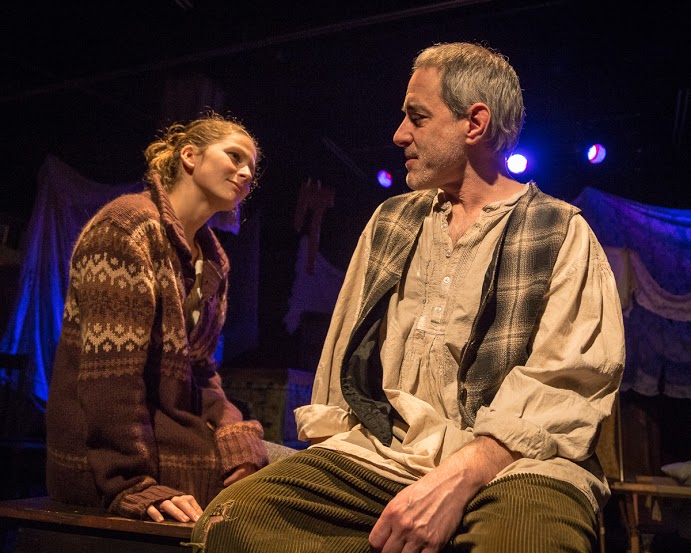Opening Nights
The Lower Depths
theLAB@INScape, 815 Seattle Blvd. S., 800-838-3006, brownpapertickets.com. $12–$18. 8 p.m. Thurs.–Sat. plus Mon., Jan. 26. Ends Jan. 31.
In 1890, muckraking photographer Jacob Riis’ How the Other Half Lives documented the squalid tenements of New York City. His middle-class readers had never seen such poverty and were forced to confront it; the book’s title became shorthand for progressivism and social reform. A dozen years later in imperial Russia, Maxim Gorky’s The Lower Depths had much the same effect.
In Theatre Machine’s revival, we’re thrust into a poor house, run by cruel, conniving Wassalissa (the formidable Alissa Cattabriga), where residents waste away their lives drinking and bickering. The din is disturbing as denizens talk over one another; slips and panties hang in the foreground, cots line the ground, and cheap booze flows. Whose turn is it to sweep? The fallen baron (Phillip Keiman) has an aversion to manual labor that bounces the responsibility from one to the next. As the bookish prostitute (Sharon Barto), the cirrhosis-stricken actor (Mark Waldstein), and the pragmatist of the group (Cole Hornaday) argue over whose turn it is to clean, Natasha (Brittany Cox), Wassalissa’s daydreaming, wide-eyed sister, introduces the newest boarder.
Compassionate interloper Luka (Bill Badgley) is both a godsend and a curse to this group. His rhetoric is incendiary, giving these derelicts hope. But who is he? While the boarders are more caricatures than individuals, Luka is purely a plot device. He’s in, then he’s out, leaving the residents to only briefly contemplate self-improvement—or even revolution.
At a time when Oxfam is predicting that one percent of Earth’s population will soon control 50 percent of global wealth, director Melissa Fenwick’s adaptation is surely topical, but with a twist: This show is a musical. Ryan Ricks and a band provide live melodic/melodramatic accompaniment: tunes by Tom Waits, Neil Young, and even a beautifully tragic rendition of The Verve Pipe’s “The Freshmen” (sung by Badgley). Call it a gimmick, but the soundtrack at least partially offsets our frustration with typical characters who never pull themselves up by their bootstraps and get out of their rut. All we see are slivers of compassion and humanity—not a class uprising.
Briefly associated with Lenin, Alexei Maximovich Peshkov adopted the pen name of Gorky (or “bitter”). If Riis’ photojournalism evoked pure pity, Gorky’s writing blurred the line between pity and disgust. Here his unvarnished gutter-dwellers create an aversion to a predicament in which we bourgeois theatergoers are complicit. The new songs lend romance, though they fail to update this pre-revolutionary stage relic to the age of Thomas Piketty. IRFAN SHARIFF
Sprawl
12th Avenue Arts, 1620 12th Ave., washingtonensemble.org. $15–$25. 7:30 p.m. Thurs.–Mon. Ends Feb. 2.
Buried in the boilerplate of the real-estate contract-cum-program for Washington Ensemble Theatre’s world premiere is a term I had not heard before: “American Terriblism,” there defined as a movement—forged by John Waters and Tim Burton and continued by the likes of Adult Swim’s Eric Wareheim and Tim Heidecker—that mocks the vacuity of the American suburban experience. Indeed, this 90-minute one-act apocalypse comedy by Joshua Conkel—whose Milk Milk Lemonade WET produced in 2011—draws more laughs skewering the dreams and dislikes of characters reared on pizza bagels and room freshener than churning dust storms of sci-fi camp.
Pregnant Shawna (Samie Spring Detzer) and misanthropic Monique (Laura Hanson) are a pair of realtors who’ve organized a book-club meeting at one of their listings: a crappy new spec home in a middle-of-nowhere development. (The tract is rendered bland as flour paste by set designers Pete Rush and Christopher Mumaw in WET’s first production in the new 12th Avenue Arts building.) Guests converge in amusing vignettes: Elaine (Marc Kenison, aka “boy-lesque” dancer Waxie Moon), the mayor’s condescending wife, prone to preening her hair into a planetary nimbus; a gay couple, both halves of whom are named William (Justin Huertas and Ben McFadden); and friends Heather (Jessie Underhill) and Bibi (Leah Salcido Pfenning). Except for Shawna, all are drawn by the social occasion—not the aspirational-pablum featured book, Whisper to the Stars. Director Ali el-Gasseir paces the comedy perfectly, with a light, nuanced hand. Cute touches like Bibi’s bookshelf-motif blouse—thanks to costumer Alirose Panzarella—snap us into the weird fairy-tale reality of the play’s world.
However, my interest waned as occult phenomena overtook Conkel’s amusingly drawn characters. The book-club members are stung by soul-infiltrating insectoids, then gradually become insectoids themselves—who are far less interesting than the people they started out as. Strobe lights, swampy gases, vomiting, alien voices, seizures . . . pretty much the full warehouse of horror-genre misfortunes gets trundled out. But even while the plagues rain down, regular old situational comedy works better for Conkel. (One of the Williams wants a baby, tries to steal Shawna’s minutes-old spawn, but forgets to cut the umbilical cord. Boing! Splat! The Three Stooges would approve.)
The cast’s all-in verve and character honing temporarily plugs many a logic hole in this enjoyably inane doomsday scenario. Nonetheless, like a tangle of cul-de-sacs, the play itself doesn’t really go anywhere. MARGARET FRIEDMAN
E
stage@seattleweekly.com




